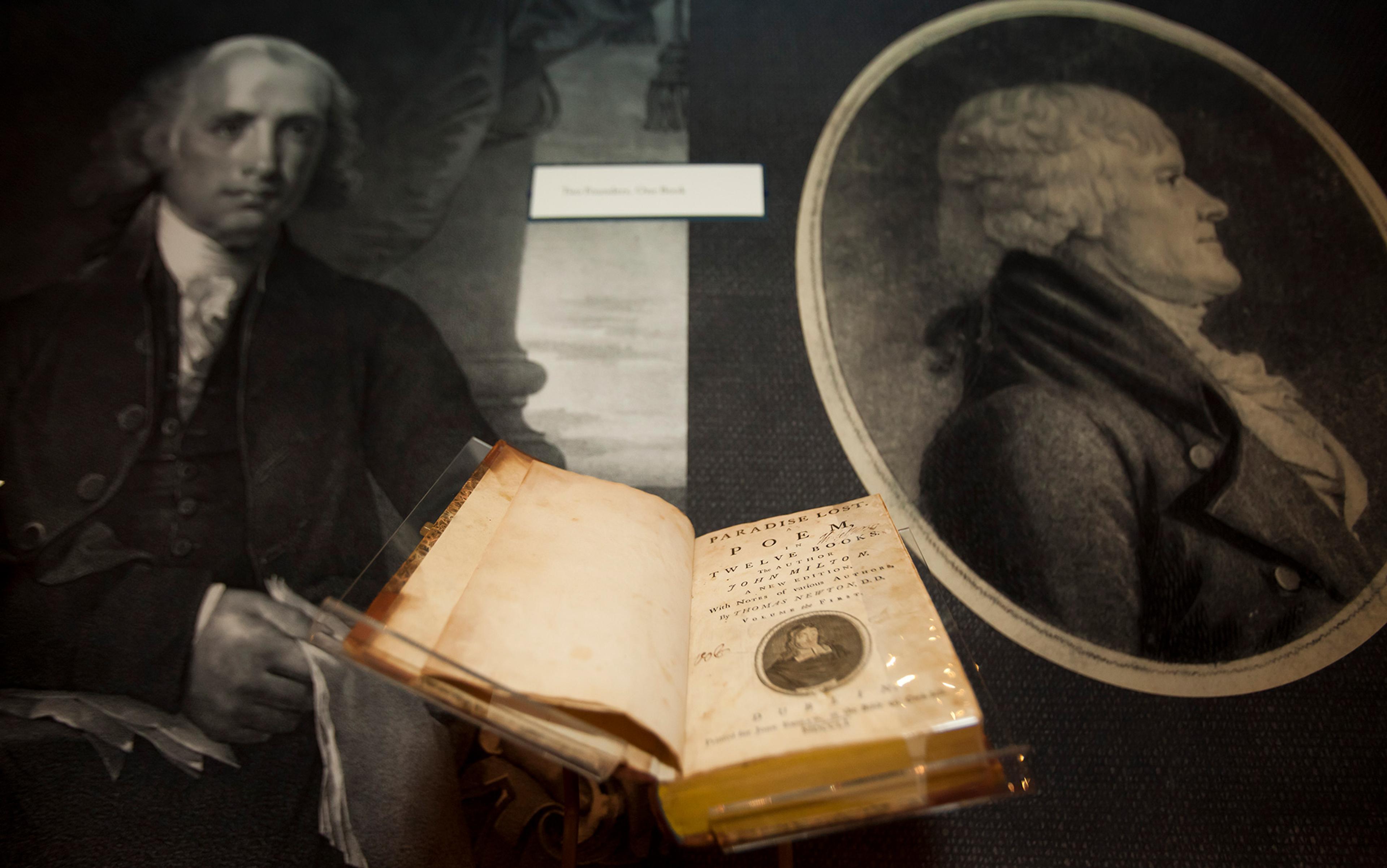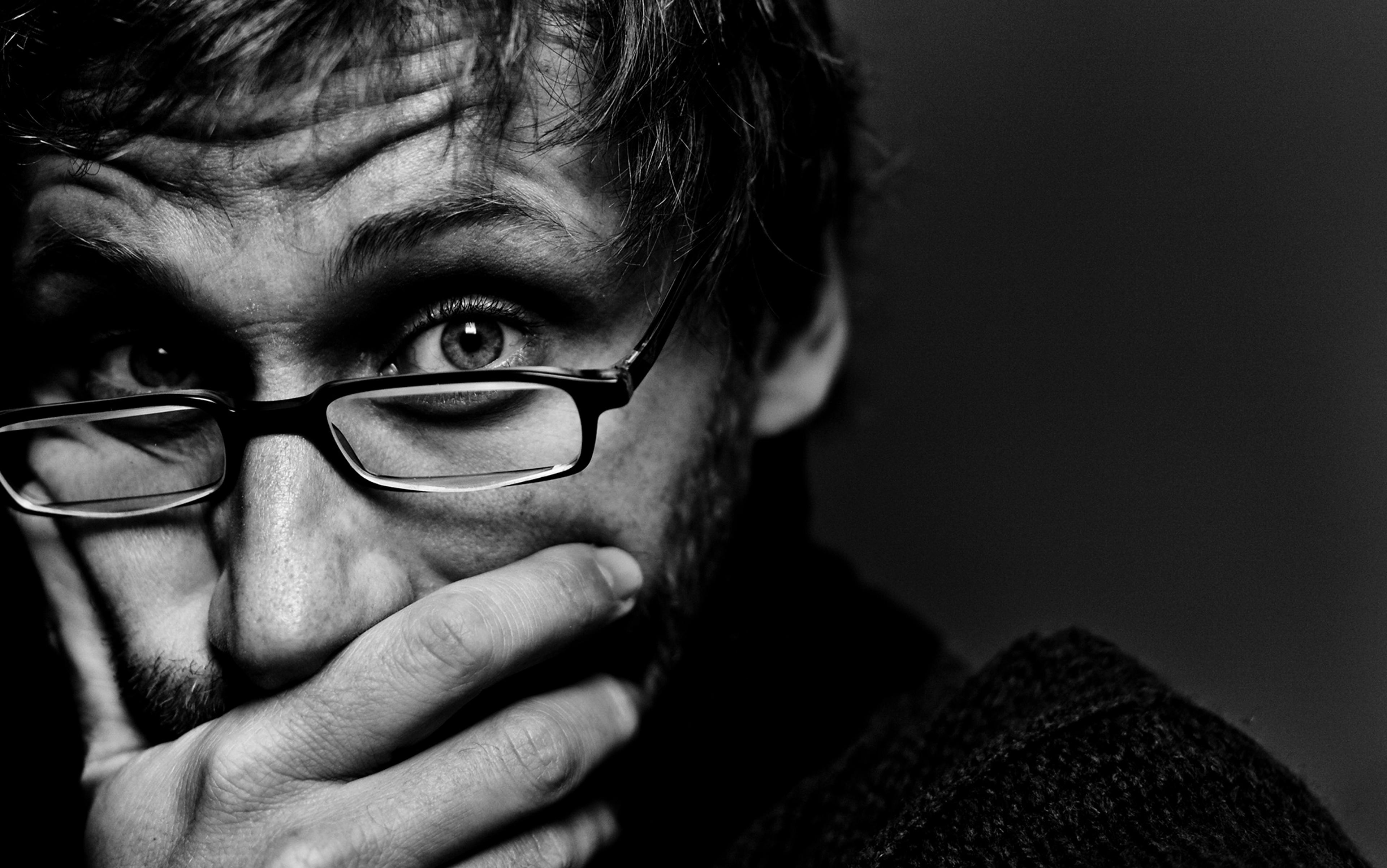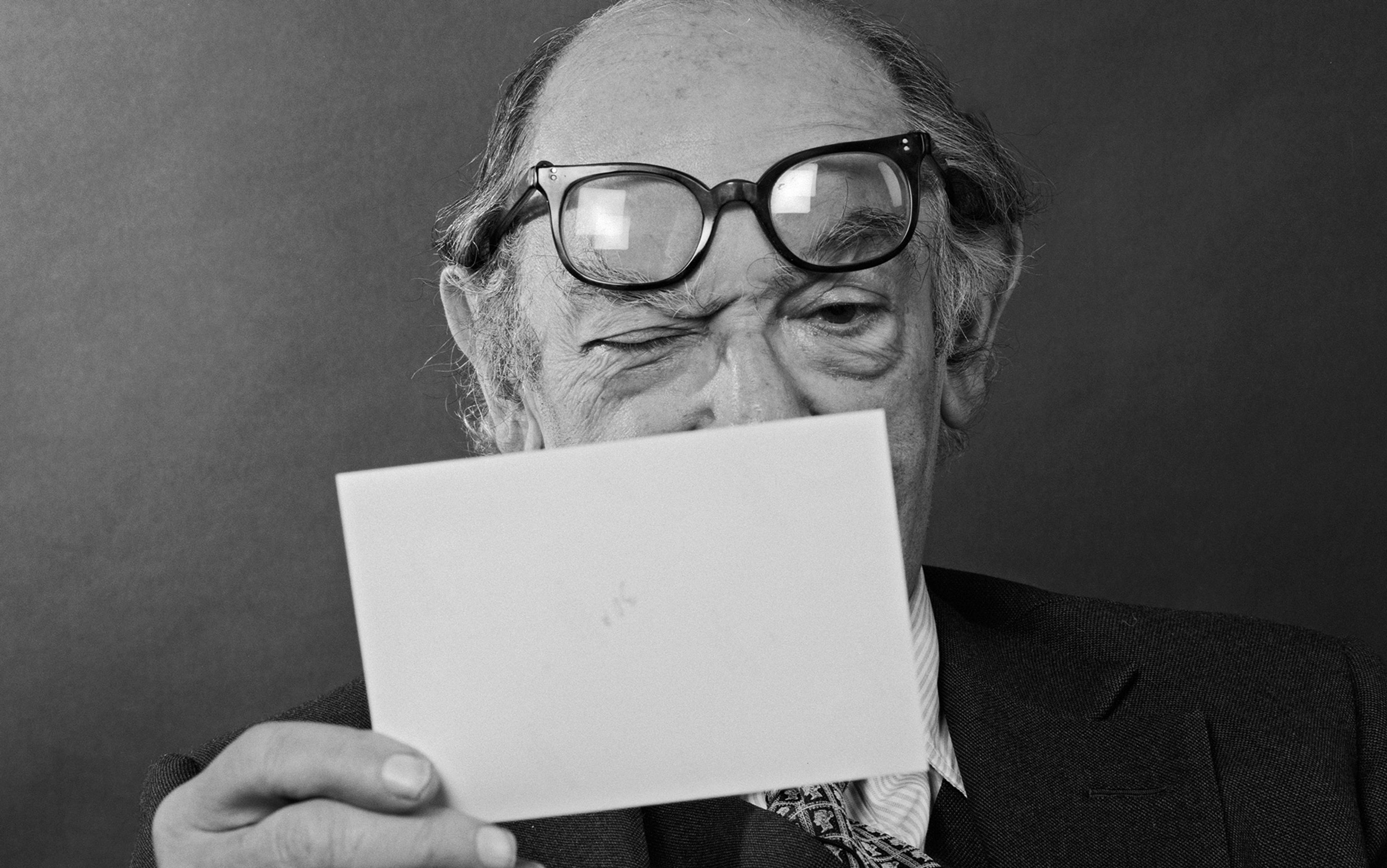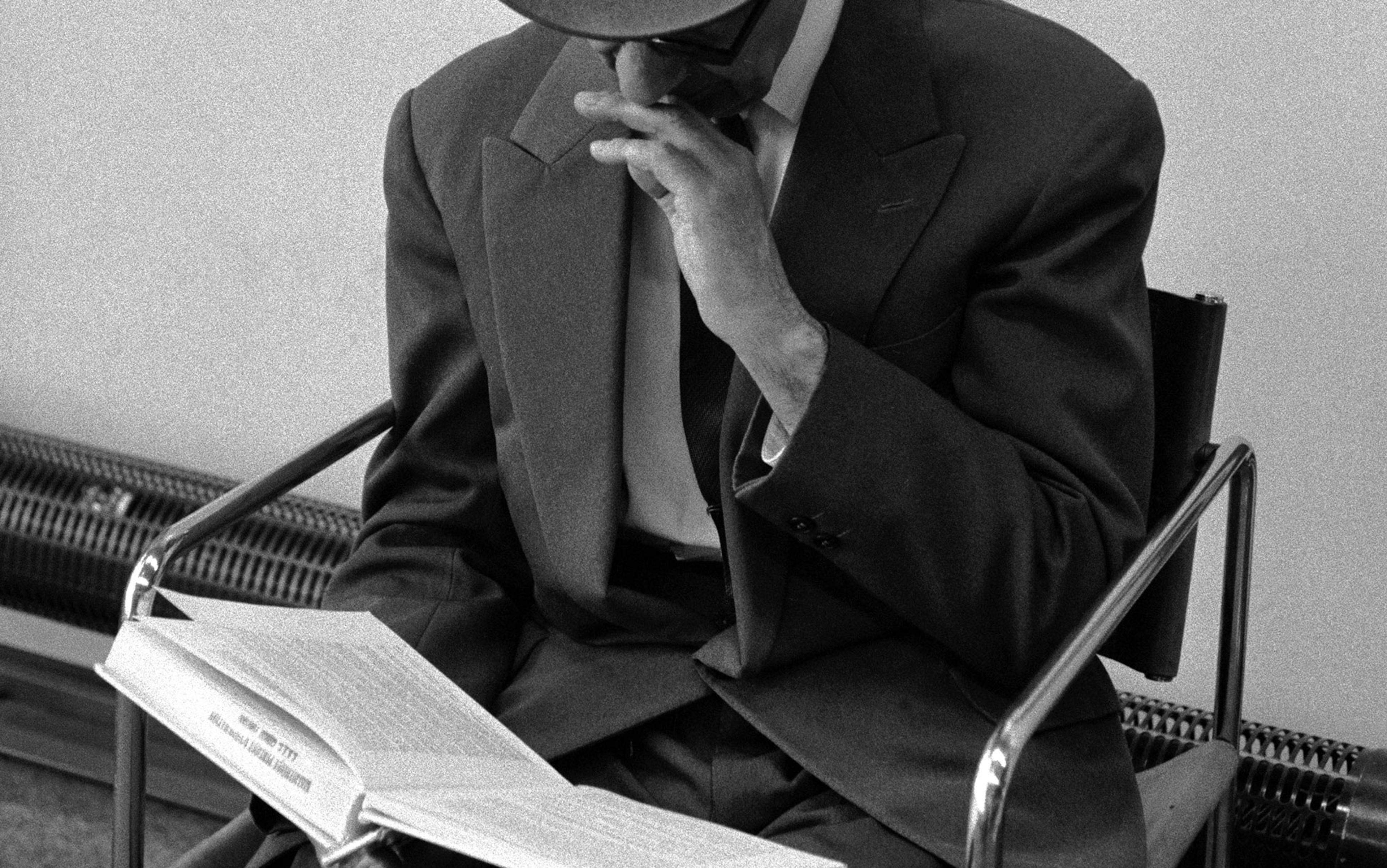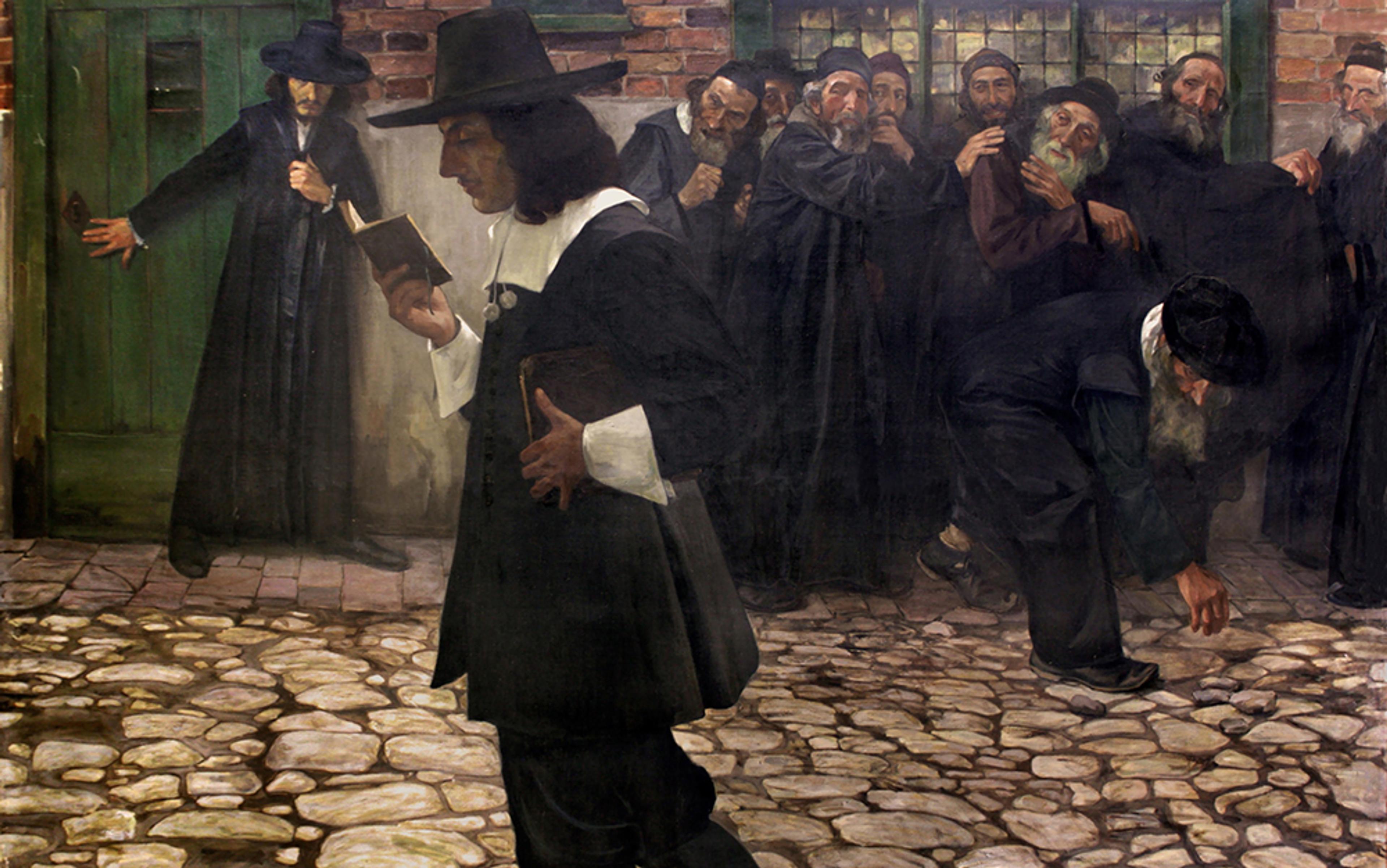Published at the height of the first English Civil War, Areopagitica: A Speech of Mr John Milton for the Liberty of Unlicensed Printing, to the Parliament of England (1644), remains a powerful defence of free expression. Printing might now have almost given way to digital media as the form in which beliefs and ideas are proposed, argued with and attacked, but the questions raised by Areopagitica about liberty of thought and speech, and more specifically writing, are more urgent than ever. John Milton, the poet who, in Paradise Lost (1667), composed an English epic that could compete with and even surpass the Greek and Latin classics, was also a prose writer of distinction. This fact tends to be eclipsed by his reputation as a poet. But in Areopagitica, he gave Western liberalism some of the language through which it still conceives of itself. It’s both illuminating and salutary, at a moment of crisis in the liberal tradition, to return to the principles that shaped that tradition. At a time when the possibility of civil war in the United States is openly entertained by some, literally as well as metaphorically, we can learn much about the tensions inherent in liberalism by returning to the origins of Milton’s arguments amid the actual civil war that raged in Britain and Ireland in the mid-17th century.
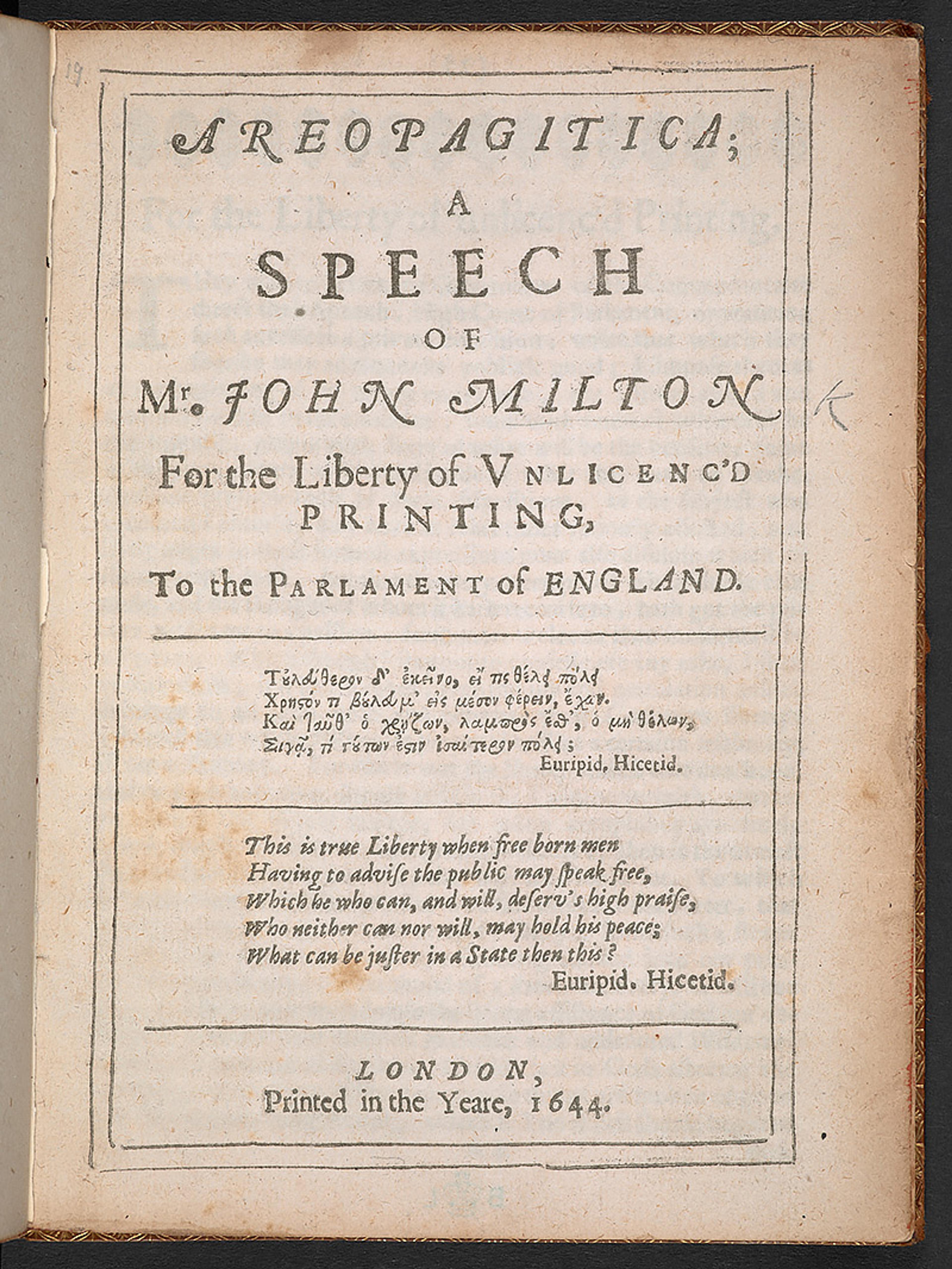
Courtesy Wikipedia
There’s little evidence that what has become Milton’s best-known prose work had any wide impact on the thinking of his contemporaries: one German reader in 1647 suggested that it should be translated into other languages to ‘give it good circulation in other lands where such tyranny reigns’, but he also thought it ‘rather too satirical’ and that its arguments needed to be ‘more moderately set forth’. The real impact of Areopagitica – the title alludes to Isocrates’ seventh oration addressed to the Areopagus, the ancient council of Athens – came in later revolutions and in different lands. Thomas Jefferson quoted it, and the comte de Mirabeau’s translation into French went through four editions between 1788 and 1792.
Its eventual influence on British thought is apparent in the echoes of its argument and imagery in John Stuart Mill’s essay On Liberty (1859), in which Mill insists that freedom of expression is a precondition of a flourishing society. The occasion for George Orwell’s powerful essay ‘The Prevention of Literature’ (1946), in which he considers the twin threats posed to ‘intellectual liberty’ by ‘totalitarianism’ and ‘monopoly and bureaucracy’, was Orwell’s dismay after attending a meeting of the PEN Club – a society founded in 1921 to further intellectual cooperation among writers – to commemorate the tercentenary of the publication of Areopagitica. That ‘no speaker quoted from the pamphlet which was ostensibly being commemorated’ was, for Orwell, an indication of the failure of his contemporaries to live up to the ideals that they claimed to promote.
The resonance of Areopagitica for US ideals of the free exchange of ideas is, however, apparent to anyone who has been to the New York Public Library. A plaque on Library Way bears this quotation from the pamphlet beside an image of a printing press: ‘Where there is much desire to learn, there of necessity will be much arguing, much writing, many opinions; for opinion in good persons is but knowledge in the making.’ More prominent is the quotation displayed above the entrance to the main reading room, which preserves the original spelling: ‘A good Booke is the pretious life-blood of a master spirit, imbalm’d and treasur’d up on purpose to a life beyond life.’
These lofty and poetic declarations emerged out of a more prosaic personal context for Milton. The outbreak of civil war between parliament and the Royalist forces of Charles I in 1642 had caused the ecclesiastical and political mechanisms of prepublication licensing in England, according to which every publication had first to be approved by a committee of bishops, to fall into disuse. The early 1640s consequently witnessed an unprecedented spike in the number of publications in England, many of them polemical attacks on the other political side in the civil war. The Westminster Assembly, composed mainly of clerics of various Puritan beliefs, had begun, by 1643, to discuss what forms of worship should replace the structures of the collapsed Church of England. It was in this atmosphere of innovation and revolution that Milton felt that he could publish, in the same year, proposals for a reform of the divorce laws that would enable a husband to separate from a wife on the grounds, not merely of nonconsummation or adultery, but of unhappiness and incompatibility. For Milton, who was 34 at this point, the argument for reform seemingly had a deeply personal impetus: in the early summer of 1642, he had married Mary Powell, but she had left him after little more than a month to return to her family, and hadn’t come back (though the two were ultimately reconciled in 1645).
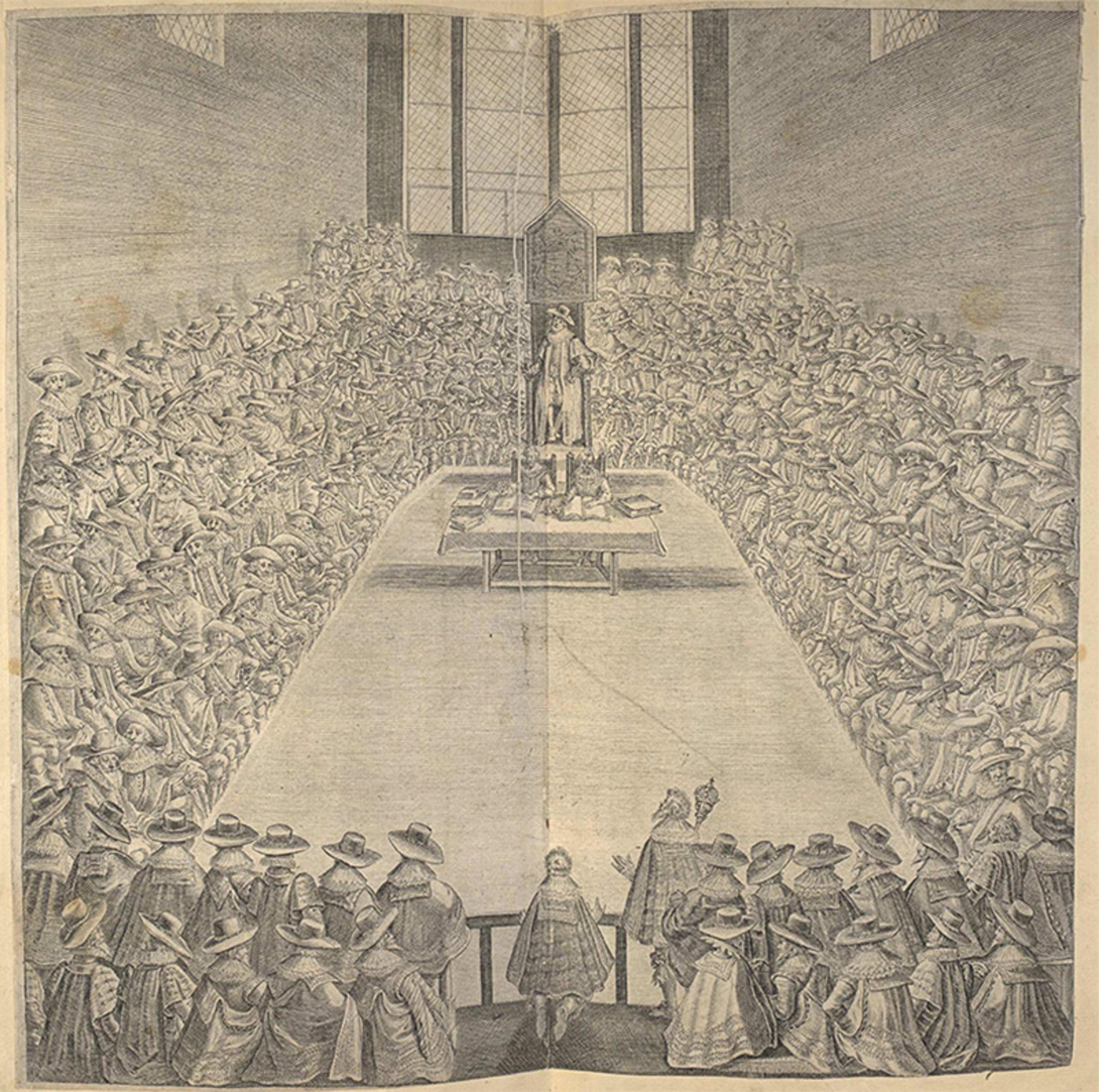
From True Platforme and Manner of the Sitting in the Lower House of Parliament (1624). This is the earliest representation of the English House of Commons sitting in the former St Stephen’s Chapel in the Palace of Westminster. Courtesy the Trustees of the British Library
The reception of his tract The Doctrine and Discipline of Divorce (1643), which he published anonymously and unlicensed, deeply shocked him: it was condemned by the Puritan clergy as being heretical and intending to foster sexual libertinism, and it was cited in petitions to parliament as evidence of the need to reinstall a system of prepublication licensing. Parliament’s Licensing Order of June 1643 required once again that appointed officers, including clerics, examine books for heterodoxy, sedition and libel before licensing them for printing. It was in response to these attempts to restore prepublication censorship on the grounds of the appearance of his own book on divorce reform, among other books charged with promoting heresy, that Milton issued Areopagitica in November 1644 (again without a licence). Yet, as I show in my intellectual biography of the young Milton, Poet of Revolution: The Making of John Milton (2020), his interest in these matters wasn’t sudden, nor entirely the result of a sense of personal insult.
Milton had been thinking hard about how censorship and state persecution suppressed intellectual and literary achievement for some years prior to Areopagitica. After leaving Christ’s College, Cambridge in 1632, he had embarked on an intensive period of reading about the history of Europe and became particularly interested in episodes of literary censorship in Italy, the country in which he lived and travelled from 1638 to 1639. In 2014, Milton’s copy of the 1544 edition of Giovanni Boccaccio’s book Vita di Dante (c1360), translated as Life of Dante, was discovered in the Bodleian Library in Oxford, complete with annotations, dating from around 1637 to 1638, that mark Boccaccio’s account of how Dante’s political work On Monarchy (1313) was burnt as a heretical text by the papal authorities. Milton even shows his awareness that Boccaccio’s account of this censorship of Dante was itself later censored and that parts of it are missing from some editions of the Life of Dante, marking in his annotations the passages that were excised by the authorities between editions. In other words, Milton identified a process of double censorship that had been imposed in different centuries on two of the Italian writers whom he most admired.
Milton’s fascination with the topic of censorship and the Catholic Church’s Index of Prohibited Books, before he wrote Areopagitica, is evident also in his surviving commonplace book, a manuscript notebook compiled mostly during the late 1630s and early 1640s, in which he gathered a list of entries to do with the prohibition of books, among other topics. He makes repeated reference there to the Historia del Concilio Tridentino (‘History of the Council of Trent’), a deeply critical account by the Venetian scholar and statesman Paolo Sarpi of the proceedings of the Council of Trent, convened by the Catholic Church from 1545 to 1563 to develop the policies of the Counter-Reformation. Sarpi’s critique of the abuses of clerical power and defence of the authority of the Venetian republic to govern its own Church was considered so potentially incendiary that his work was smuggled out of Venice in instalments and first published under a pseudonym in London in 1619. Milton refers to ‘Padre Paolo the great Venetian antagonist of the Pope’ in his first major work of polemical prose, Of Reformation (1641), warning that the same clerical usurpation of political power recorded by Sarpi in Counter-Reformation Italy had occurred in England under the bishops of the Church of England under Charles I.
Milton turns to the pagan understanding of rational choice as the exercise of virtue
The two major intellectual figures that we know Milton visited during his European tour of 1638 to 1639 were the Dutch polymath Hugo Grotius, an exile in Paris for his theological views, and Galileo, placed under house arrest in Florence since 1633 for his belief that the Earth moved around the Sun. The meeting with Galileo is recounted in a key moment in Areopagitica, as Milton warns parliament that the adoption of such measures as the Licensing Order would foster in England, as it had in Italy under the Index, fear and servility that were inimical to any real intellectual and literary achievement:
I have sat among their learned men, for that honour I had, and been counted happy to be born in such a place of philosophic freedom, as they supposed England was, while themselves did nothing but bemoan the servile condition into which learning amongst them was brought; that this was it which had damped the glory of Italian wits; that nothing had been there written now these many years but flattery and fustian. There it was that I found and visited the famous Galileo, grown old, a prisoner to the Inquisition, for thinking in astronomy otherwise than the Franciscan and Dominican licensers thought.
In referring to the ‘philosophic freedom’ that his Italian acquaintances believed that they had lost, and which they erroneously believed to be preserved in England, Milton translates into English a Latin phrase, libertas philosophandi, which appears to have been used in print for the first time by Tommaso Campanella in his Apologia pro Galileo (‘Defence of Galileo’) in 1622. Campanella argued for the necessity of ‘the freedom of philosophising’ in Christian nations, perhaps himself echoing Galileo, who in several of his writings had quoted the dictum attributed to the Platonic philosopher Alcinous: ‘The philosopher needs to think like a free-born man.’ ‘Philosophy’ here encompasses ‘natural philosophy’, or what we call science: the modern concept of ‘academic freedom’ has roots in this 17th-century notion of ‘philosophic freedom’.
The striking personification of suppressed books as persecuted martyrs to the truth, with which Milton opens Areopagitica, introduces his repeated claim that the English parliament is acting like the Inquisition in their tyrannous imposition of prepublication censorship:
We should be wary therefore what persecution we raise against the living labours of public men, how we spill that seasoned life of man, preserved and stored up in books; since we see a kind of homicide may be thus committed, sometimes a martyrdom, and if it extend to the whole impression, a kind of massacre …
It might be contended that such imagery of martyrdom shows Milton to have been concerned with religious truth only, and that his arguments aren’t intended to have any relevance to wider issues of intellectual liberty and free speech. Certainly, Milton places his arguments in the context of a struggle to articulate religious truth against persecution by clerical elites, which he identified with the history of the Reformation. But he invokes historical examples of religious persecution to show how censorship and heresy-hunting have suppressed intellectual endeavour of all kinds, in different times and in different countries. Nothing of enduring value can be created under such conditions of intellectual enslavement: in one of his polemics against the episcopal Church of England in 1642, Milton had already declared that he would be prevented from fulfilling his own ambition to write an epic poem in English that could equal the achievement of Homer and Virgil until the nation had ‘enfranchised herself from this impertinent yoke of prelacy, under whose inquisitorious and tyrannical duncery no free and splendid wit can flourish’.
Indeed, perhaps the most radical move that Milton makes in Areopagitica, although it’s rarely given much prominence, is to transform the definition of ‘heresy’ by returning the term to its etymological root in the Greek proairesis. In the Nicomachean Ethics, Aristotle uses proairesis to mean the intellectual process of distinguishing and choosing between good and bad. In place of the Augustinian definition of heresy as that which is forbidden and needs to be rooted out of Christian belief, Milton turns to the pagan understanding of rational choice as the exercise of virtue. ‘Reason is but choosing,’ declares Milton, and true knowledge is a product of a rational encounter with diverse opinions and arguments, whether or not they’re potentially dangerous: ‘He that can apprehend and consider vice with all her baits and seeming pleasures, and yet abstain, and yet distinguish, and yet prefer that which is truly better, he is the true wayfaring Christian.’ It’s fundamental to the Christian life to face a continual trial of one’s virtue and to have to choose between good and evil in books and ideas, as in all other things. Paradise Lost is Milton’s ultimate meditation on the origin of human existence as a trial of virtue.
Milton also turned to ancient Greek values in asserting the importance of speaking truth to power. The title page of Areopagitica bears a motto from Euripides’ tragedy The Suppliants, which Milton both quotes in Greek and then translates:
This is true Liberty when free born men
Having to advise the public may speak free,
Which he who can, and will, deserves high praise,
Who neither can nor will, may hold his peace;
What can be juster in a State then this?
These lines invoke the Athenian concept of parrhesía, a form of free and bold speech, usually voiced by a distinguished citizen addressing a public assembly on a controversial matter. Milton represents himself as a parrhesiastés, whose love of liberty has impelled him to criticise parliament publicly at some risk to his own safety. But Milton didn’t conceive of free speech as most Western societies do today (or, at least, as they have tended to conceive of it over the past two centuries): as a right secured by law and protected in the courts. As the historian James Hankins has shown in his book Virtue Politics (2019), for humanists in Renaissance Italy: ‘To speak with freedom, to advocate what was right, especially before a tyrant or a howling mob, was a great virtue that required other virtues such as prudence and courage.’ We read Milton anachronistically if we fail to realise that free speech is similarly for him, as for the great Renaissance humanists, primarily the exercise of virtuous character, not a right enshrined in law. By speaking freely, a person demonstrates their possession of moral virtue; and their freedom to speak in such a manner embodies the virtuous nature of the society in which they live.
Milton argues not for legal rights but against legislation that prevents and prohibits freedom of speech – at least until it’s concluded, after publication, that a book promotes ideas so ‘impious or evil absolutely either against faith or manners no law can possibly permit’ them, in which case ‘the fire and the executioner will be the timeliest and the most effectual remedy’. In other words, let heretical ideas be published, then judge them: if they are found wanting, punishment is appropriate. But ideas shouldn’t be censored in advance of their airing, an act that Milton compares to a kind of intellectual stillbirth: the ‘issue of the brain’ should be ‘no more stifled than the issue of the womb’.
Of course, this qualification raises the question of who decides on the harmful effects of a text after its publication: these lines are habitually cited to prove the sharp limits or elitism of Miltonic liberty and demonstrate its disappointing distance from modern liberal conceptions of free speech as a fundamental legal right. The conviction that books can be suppressed after publication, if they are found ‘impious or evil’, derives in part from Milton’s notion of virtue as the exercise of reason in choosing between good and evil. Truth will emerge from a dialectical process of sifting good from evil, which Milton imagines as a form of intellectual combat: ‘who ever knew Truth put to the worse, in a free and open encounter.’ Here, Milton’s arguments most clearly anticipate the concept of the ‘marketplace of ideas’ that’s associated with Mill’s essay On Liberty and that has often been invoked in debates about the freedom of the press in liberal democracies, and which no doubt was directly influenced by Milton’s pamphlet.
Societies can foster intellectual liberty only by somehow restraining those who would deny it
One aspect of Milton’s arguments against prepublication licensing is indeed an insistence that parliament’s reimposition of licensing was influenced by lobbying from the Company of Stationers, whom he accused of seeking to retain a commercial monopoly on the print trade. His images of truth sometimes continue this commercial theme as he transfers the charge of monopoly from economic to intellectual and religious contexts: ‘Truth and understanding are not such wares as to be monopolised and traded in by tickets, and statutes, and standards.’ To allow any interest group to control the circulation of ideas, in the way that a company seeks to control the market in pursuit of its own profit, will lead to the general intellectual and spiritual poverty of a society.
Yet for all the surface similarities between the liberal concept of an untrammelled, deregulated marketplace of ideas and Milton’s demand for an absence of legislation, which would allow readers to choose the good and the true and reject the false and evil, Milton was not only insistent that bad books should be suppressed, once they had been found to be bad, but adamant also that those who sought to espouse intolerance should themselves be denied the freedom to do so:
I mean not tolerated Popery, and open superstition, which, as it extirpates all religions and civil supremacies, so itself should be extirpate, provided first that all charitable and compassionate means be used to win and regain the weak and the misled.
The second part of this statement, which asserts the importance of charity and persuasion, is usually left out by those quoting the first part to show that Milton was, at heart, a religious bigot, and that his ideas about free speech and intellectual liberty have little to teach us about liberalism today. Nonetheless, Milton remains vague on whether he means by this that prepublication censorship is, after all, permissible in the case of those who would impose the structural repression of free speech by ‘extirpating’, or destroying utterly, all other forms of belief and government. The issue of whether we should tolerate those who would take advantage of freedom of speech to encourage violence, illegality and intolerance is today more urgent and live than it has ever been, whether in relation to ‘hate speech’ or to religious extremism. Milton, writing in the midst of a devastating civil war, maintained that societies can foster intellectual liberty only by somehow restraining those who would deny it: in its rousingly eloquent articulation of problems that continue to bedevil liberalism, the arguments of Areopagitica still matter in the information age.
